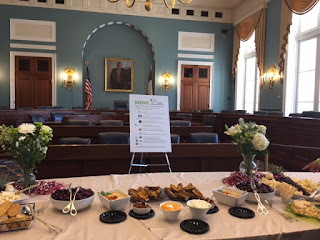Chris McGann
Communications
In the world of national politics, corn is king and Iowa often takes center stage. But here in Washington, where the agricultural economy is driven by tree fruit, dairy, potatoes and hay to name just a few major products, it’s easy to feel overlooked.
 |
Director Derek Sandison and a delegation of leaders from the
agriculture community met with elected officials in Washington DC
this summer to help keep our issues in the mix. |
That’s why WSDA Director Derek Sandison recently joined a delegation of WSU leadership and our state’s agricultural community in Washington D.C. to help make sure our issues and products aren’t forgotten as the debate over international trade policies continues.
Sandison and the group met with Washington’s elected officials, key lawmakers and administration representatives. While many of the meetings touched on topics related to the 2018 Farm Bill, including the importance of research, the group also discussed the possible impacts of recent trade disputes with China, Canada, and Mexico.
“Our representatives seemed engaged and genuinely concerned,” said Sandison, who has been in regular communication with the administration and Congress on these topics.
This recent meeting was particularly important.
“With so many highly important policies and issues on the table right now, these meetings could not have come at a better time,” Sandison said. “Our elected leaders heard what we had to say and were very supportive of the work we are doing to advance agricultural practices and promote trade.”
 |
WSDA Director Sandison discusses trade issues with Senate Agriculture
Committee Chairman Pat Roberts. André-Denis Girard Wright, the newly
named dean of the WSU College of Agricultural, Human and Natural
Resource Science sits at Sandison’s right. |
The group, which included representatives from the wheat, tree fruit, dairy, potato, and wine industries, spent time with U.S. Senate Agriculture Committee Chairman Pat Roberts, R-Kan., who commented that Sen. Maria Cantwell doesn’t ever let him forget about Washington. He said Cantwell is always “whispering in his ear” about the implications policies have on tree fruit, wheat and other Washington products.
Washington State University took part in the mission to promote research and education. University President Kirk Schulz discussed issues and opportunities to collaborate with administration officials responsible for the U.S. Department of Agriculture research portfolio.
 |
A Taste of Washington reception showcasing our state’s fruit,
wine, cheese and other signature products. Nearly 200 people
attended, including lawmakers Rep. Dave Reichert,
Rep. Dan Newhouse and Rep. Rick Larsen. |
Sandison said the research goes hand-in-hand with trade, another major focus of the visit. An estimated $900 million in agricultural and food products could potentially be affected by retaliatory tariffs. Tariffs on Washington apples have gone up to 75 percent in India, 50 percent in China and 20 percent in Mexico.
Shortly after the group’s visit, the Trump administration announced a $12 billion aid package to reduce the harm associated with retaliatory tariffs, though it is unclear how it will assist Washington ag sectors affected by the trade disputes.



